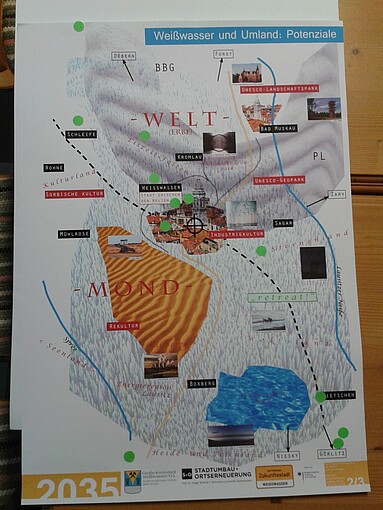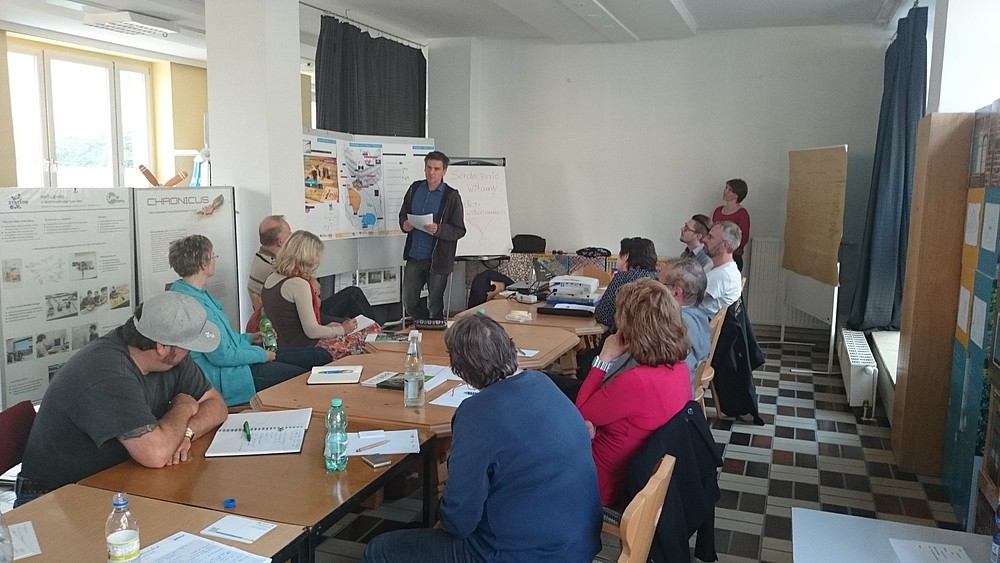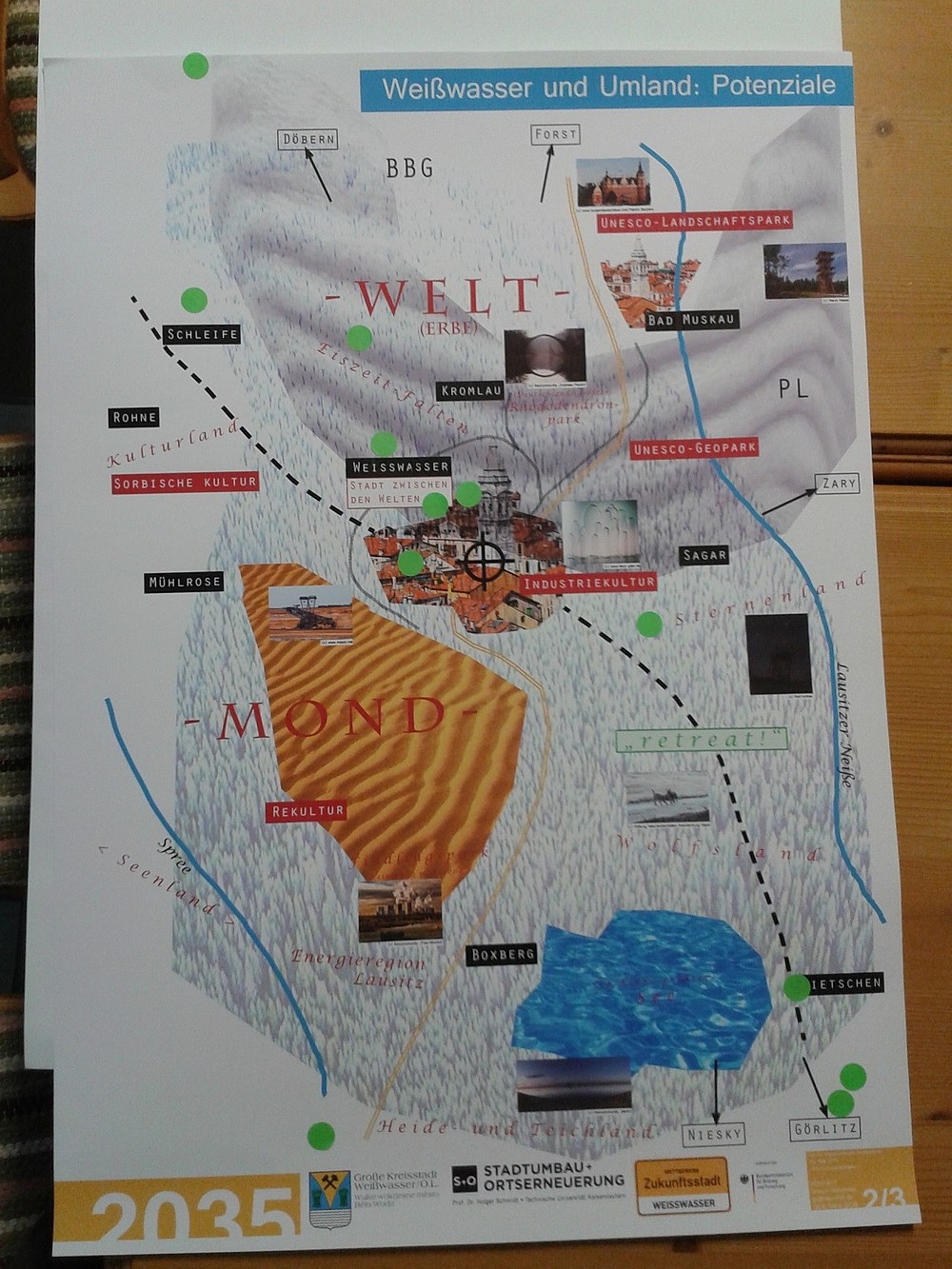The 5th theme evening of the Zittau/Görlitz University of Applied Sciences took place under the title "Tourism in Lausitz - ideas for the future" on 26.05.2016 in the premises of Straße der Glasmacher 8 in Weißwasser .
Katrin Treffkorn, a researcher at the TRAWOS Institute, moderated the evening and welcomed the initiators and guests from the WSW city administration, the Görlitz district office, the Neißeland Tourist Association, the Lausitz Technology Center, the Lausitz Economic Initiative (Wil) and tourism providers from Weißwasser and the surrounding area.
At the beginning, Frank Schwarzkopf presented the long-standing tasks of the tourism information of the city association in WSW, the developments in the field of tourism and the monuments of industrial culture in recent years. Although tourism in Weißwasser is not an economic giant, it is a real and important economic factor, said Schwarzkopf. Tourism is not just about holidaymakers cycling through the town and the surrounding area, riding the forest railroad, exploring the Braunsteich nature reserve or the UNESCO Upper Lusatian Pond and Heath Landscape Biosphere Reserve, but also includes "all activities of people who travel to places outside their usual environment and stay there for leisure, business or certain other purposes for no longer than one year without interruption," emphasizes Schwarzkopf. With the UNESCO certificate awarded to the Muskau Arch Geopark these days, the joint efforts with partners from the surrounding area have been rewarded once again. This is because there are now a total of three UNESCO-certified landscapes in the vicinity of WSW (Bad Muskauer Park World Heritage Site, Upper Lusatian Heath and Pond Landscape World Heritage Site), confirming their supra-regional importance. A central cross-border tourism base in the WSW railroad station as a barrier-free arrival and distribution station for guests from near and far in the region is therefore one of the development goals formulated for the coming years, which is to be realized in cooperation with German and Polish partners.
International, national and regional trends, such as the growing need to stage more sensory experiences in addition to tourist products and services, will also be taken into consideration. Prof. Ute Pflicke from the Zittau/Görlitz University of Applied Sciences then went into this in more detail when she presented the INNO-Tour project - innovation networks for the development of regional cross-provider concepts and innovative products for small and medium-sized enterprises in cultural and health tourism. This is because the region has potential in the form of many small companies in the field of adventure, cultural and health tourism. However, these often lack the capacity to develop and sustainably profile new products. The current research project therefore aims to network the potential of these companies; as well as with the corresponding educational and research potential of the HSZG in the field of tourism, culture and health management, in order to make global innovative development trends in the leisure and tourism industry more accessible and easier to use for individual companies as well as for the entire region through cross-provider exchange of experience and knowledge transfer.
Today's innovation potential in the tourism sector lies above all in the development and intensification of trusting cooperative relationships between complementary tourism providers in order to improve the quality of products and services and sustainably develop the attractiveness of the destination by exchanging knowledge and sharing investment risks, emphasizes Pflicke in her remarks and offers active cooperation with the university's tourism management department.
A very practical form of cooperative alliances, including those of tourism companies in the human resources sector, are so-called employer alliances. By flexibly combining the partial needs of the participating companies, stable, year-round employment relationships can be created in the region and more attractive working conditions can retain qualified employees in the long term, explains Sigrid Wölfing from tamen Entwicklungsbüro Arbeit und Umwelt in Berlin, who has been supporting such company mergers throughout Germany for years, in the third keynote speech of the evening.
The fact that this can also be a practical innovation strategy for tourism professionals in Lausitz to ensure qualitative standards was confirmed by the subsequent exchange of experiences between those present about legal hurdles (e.g. the Employer Transfer Act) in overcoming the current difficulties in offering skilled workers here long-term career development prospects and thus promoting the attractiveness of the region not only as a tourist destination but also as an economic area with attractive working and living prospects.
Gregor Schneider from the WSW planning workshop introduces the subsequent discussion with explanations of the tourism aspects of the future city concept 2035 recently adopted by the WSW city council, which deliberately focuses on the 360° region around WSW. Attractively networked via "smart" infrastructures, WSW as an "oasis in the outback" opens up a culture of enabling and becomes the lively center of a multifaceted region between post-mining landscapes, industrial culture and UNESCO World Heritage Sites, according to the vision. This can become reality if regional cooperation is deepened, economic structural change is proactively shaped, WSW bundles expertise and information as an arrival and distribution station and networks more closely as a trustworthy cooperation partner, Schneider summarizes the recommendations for action developed by the planning workshop.
Previously unachieved goals of numerous written tourism development concepts and tourism marketing structures at district level that are too far removed from practice, which were pointed out by the participants in the detailed discussion, make it clear that not only structural obstacles but also mental blocks need to be overcome.

Those present showed great interest in pursuing the topic of sustainable tourism development in the region and also in initiating strategic cooperation in tourism in the region through practical collaboration. However, a continuous practical exchange between different tourism and municipal stakeholders in order to get to know and perceive each other as potential cooperation partners, to build trust in the joint potentials in order to be able to develop cooperative strategies together, represent the basis for this, which WSW as a central location should not only consider but also take up proactively as part of the implementation of its tourism strategy.
A university theme evening can only be a stimulating impulse for this, which could also be repeated on this topic in due course.
Author:
Katrin Treffkorn


